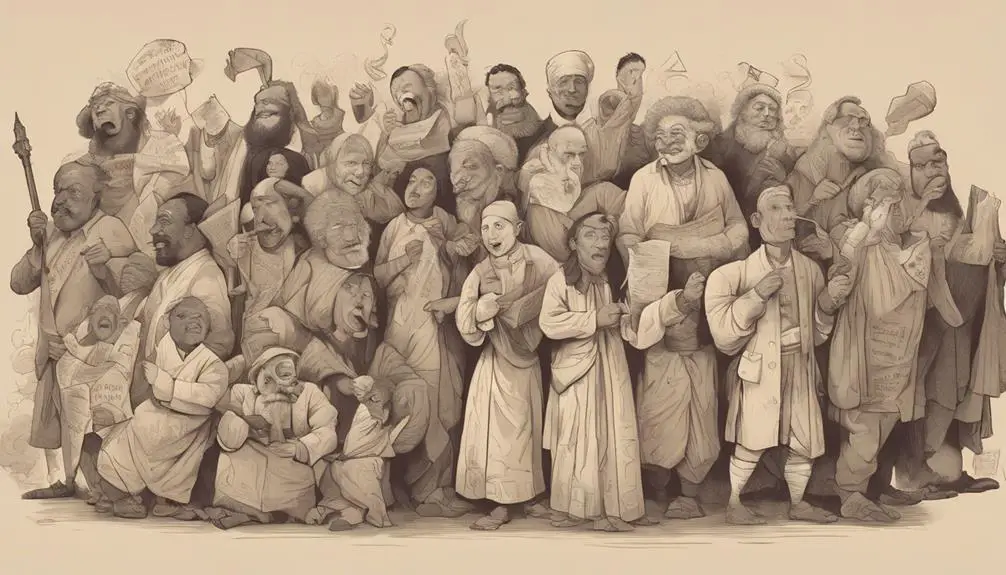Charting the scornful echoes of mockers in biblical tales, uncover lessons that resonate with timeless wisdom and modern relevance.

Mocker in the Bible
Imagine walking through a bustling marketplace in ancient times, where amidst the clamor, you overhear a scornful laugh aimed at a prophet's solemn warnings. This scene encapsulates the essence of mockery in the Bible, a topic that's both complex and intriguing.
You've likely encountered mocking in contemporary life, but understanding its roots and repercussions in biblical contexts can offer profound insights. By exploring the examples and teachings related to mockers in scripture, you'll uncover not only the consequences faced by those who scorned divine messages but also valuable lessons on how to navigate a world where mockery still echoes.
Why does this matter for modern believers? Let's find out together.
Key Takeaways
- Biblical mockery often served as a moral or prophetic tool, highlighting issues of pride, arrogance, or ignorance.
- Examples of mockers in Scripture demonstrate varied consequences, including personal downfall and societal discord.
- Turning away from mockery involves repentance, reflection on the motivations behind such behavior, and a commitment to positive communication.
- Modern believers are advised to avoid mockery, fostering an environment of respect, unity, and love in accordance with biblical teachings.
Defining Biblical Mockery

Biblical mockery, often depicted as scornful or derisive behavior, plays a pivotal role in various narratives and teachings throughout the scriptures. Delving into its origins, you'll find that mockery in the Bible isn't merely an expression of disdain but often serves a deeper, moral or prophetic purpose. The cultural perceptions of mockery in ancient times were complex, intertwined with notions of honor, shame, and societal norms. Unlike today's understanding, which might simply equate mockery with bullying or rudeness, biblical mockery could carry prophetic or corrective undertones.
Understanding mockery's origins requires a look into the Hebrew and Greek words translated as 'mock' or 'scorn,' each nuanced to reflect different levels of ridicule and its intended outcomes. These linguistic nuances shed light on how cultures surrounding the biblical narrative perceived and utilized mockery. It wasn't solely negative; sometimes, it was a tool for instruction or divine judgment.
Grasping these cultural perceptions helps you appreciate the multifaceted role of mockery in biblical times. It wasn't just about belittling others; it was deeply rooted in societal and divine frameworks, serving purposes that went beyond mere humiliation or scorn.
Examples of Mockers in Scripture

Having explored the cultural and linguistic nuances of mockery in the Bible, let's now examine specific instances where characters embody or confront mockery within the scriptural narratives. The Bible presents various examples where mocker characteristics and mocking responses illuminate the depth and complexity of human interactions.
- Nabal's disdain for David (1 Samuel 25): Nabal's scornful rejection of David's request for provisions showcases the arrogance and foolishness often associated with mockers. His derisive attitude prompts a swift and nearly disastrous response, illustrating how mockery can escalate conflicts.
- The youths mocking Elisha (2 Kings 2:23-24): This incident, where youths jeer at Elisha, calling him 'baldhead,' underscores the disrespect and irreverence that typify mocking behavior. The severe consequence they face serves as a stark reminder of the gravity of such actions.
- Sanballat's mockery of Nehemiah (Nehemiah 4): Sanballat's ridicule of the Jews rebuilding Jerusalem's walls reveals a tactic designed to demoralize and discourage. However, Nehemiah's prayerful and resolute response highlights how faith and determination can overcome the discouragement sown by mockers.
- The soldiers mocking Jesus (Matthew 27:27-31): The soldiers' mocking of Jesus before his crucifixion embodies the cruelty and heartlessness possible in human behavior. This episode provides profound insights into the response to mockery—bearing it with dignity and silence.
These examples not only reflect the varied manifestations of mockery but also the range of responses to it, from confrontation to patient endurance.
Consequences of Mocking

While the Bible offers numerous instances of mockery, it also meticulously outlines the dire consequences that often follow such scornful behavior. You'll find that mockery's roots often lie in pride, arrogance, or ignorance, leading individuals to scorn others without considering the moral and spiritual repercussions. The biblical texts suggest that those who engage in mockery not only face personal spiritual degradation but also contribute to societal discord. The societal impacts of mockery are profound, as it fosters division, undermines respect, and erodes the sense of community.
The scripture warns that mockers may find themselves alienated, not just from their peers, but also from divine guidance and wisdom. This estrangement is depicted as a natural consequence of their actions, a self-inflicted isolation resulting from their refusal to value and respect others. Moreover, the Bible underscores that the repercussions of mockery extend beyond the immediate social circle of the mocker, affecting the broader community by perpetuating a culture of disdain and disrespect.
Therefore, the consequences of mocking, as illuminated by biblical teachings, serve as a cautionary tale. They remind you that words and attitudes carry weight, influencing not just personal destiny but also the fabric of society.
Turning Away From Mockery

Turning away from mockery is an essential step toward personal growth and spiritual maturity, as it fosters an environment of respect and mutual understanding. Understanding the mockery origin helps you recognize the harmful nature of such behavior, encouraging a shift in perspective. Repentance steps are crucial in this transformation, guiding you toward a more compassionate and empathetic stance.
To deepen your understanding, consider the following:
- Reflect on the reasons behind your inclination to mock others. Is it a defense mechanism, or perhaps a way to fit in with a certain group?
- Acknowledge the impact of your words and actions on others. Understanding the hurt caused by mockery can be a powerful motivator for change.
- Seek forgiveness from those you've wronged. This step not only aids in your personal growth but also helps heal the wounds inflicted by mockery.
- Commit to positive communication practices. Replace mocking remarks with constructive and supportive dialogue.
Lessons for Modern Believers

Reflecting on the teachings surrounding mockery in the Bible offers modern believers valuable insights into navigating contemporary social interactions with grace and integrity. These ancient narratives reveal not just the spiritual consequences of mockery but also underscore the importance of fostering respectful dialogues. By drawing modern parallels, believers are encouraged to consider the societal impacts of their words and actions.
Biblical Principle |
Modern Parallel |
Societal Impact |
|---|---|---|
Proverbs 22:10 – Drive out the mocker, and conflict goes too |
Eliminating toxic behavior in communities |
Promotes peace and unity |
Psalm 1:1 – Blessed is the one who does not sit in the company of mockers |
Choosing positive influences |
Enhances personal and spiritual growth |
Matthew 5:44 – Love your enemies |
Responding to negativity with kindness |
Reduces hostility, fosters empathy |
James 4:11-12 – Do not slander one another |
Encouraging constructive conversations |
Strengthens relationships, builds trust |
Ephesians 4:29 – Let no unwholesome talk come out of your mouths |
Promoting uplifting communication |
Cultivates a supportive, respectful community |
Frequently Asked Questions
How Do Different Bible Translations Handle the Term "Mocker" and Its Variations, and Does This Affect the Interpretation of Related Passages?
Different Bible translations approach the term 'mocker' and its variations with varied translation methodologies, reflecting linguistic evolution.
This diversity can significantly affect your interpretation of related passages. By analyzing how each version translates these terms, you'll notice shifts in nuances and meanings.
It's crucial to consider these differences, as they can alter the original message's intent, impacting your understanding of the text in a profound way.
Are There Cultural or Historical Contexts in the Time of the Bible That Might Influence Our Understanding of What Constituted Mockery?
Yes, understanding the cultural and historical contexts of the time can significantly influence your grasp of what constituted mockery. These origins of mockery are deeply rooted in societal norms and values, carrying heavy social ramifications.
How Do Biblical Views on Mockery Compare With Those in Other Ancient Religious or Philosophical Texts of the Same Era?
When you explore mockery ethics through a comparative analysis of ancient texts, you'll find diverse perspectives. Different cultures and religions of that era had their own views on mockery, which can significantly vary from the biblical standpoint.
This analysis allows you to understand how societies valued respect and the boundaries of humor. It's fascinating to see the similarities and differences in how ancient civilizations navigated the ethics of mockery.
In What Ways Might Modern Psychology and Biblical Teachings on Mockery Intersect or Diverge, Particularly Regarding the Impact on Individuals and Communities?
You're exploring how modern psychology and biblical teachings on mockery might align or differ, especially in their effects on people and groups. Both fields examine mockery techniques and their impact, but they diverge in solutions and interpretations.
While psychology may focus on building psychological resilience against mockery, biblical perspectives often advocate for moral and spiritual responses. Understanding both can offer a comprehensive view on handling mockery's effects on individuals and communities.
Can Examples of Mockery in the Bible Be Connected to Any Contemporary Social or Political Movements, Offering Insights Into Their Motivations or Strategies?
You can draw connections between historical examples of mockery and today's social or political movements through careful mockery analysis. By comparing these instances, you'll find social parallels that offer deep insights into current motivations or strategies.
This approach doesn't just highlight similarities but also helps understand the impact of mockery on communities and individuals. It's an academic exploration that respects both past and present, aiming to enlighten contemporary discourse.
Conclusion
In analyzing biblical texts, it's evident that mockery isn't merely an act of jest but carries profound moral implications. Scripture presents numerous instances where mockers face dire consequences, underscoring the destructive nature of such behavior.
As modern believers, you're called to heed these examples, recognizing the power words hold and the importance of fostering respect and understanding. Turning away from mockery isn't just about avoiding negative outcomes; it's a step towards embodying the compassionate and respectful spirit that faith advocates.



Sign up